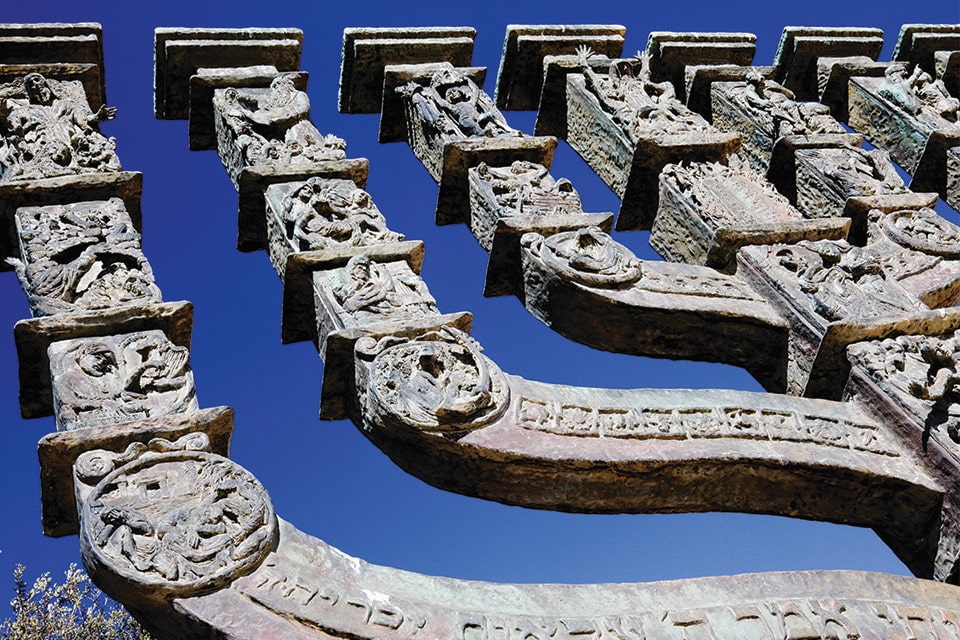A Call for a Hanukkah Miracle in the Middle East

The opinions expressed in this article are the author's and not necessarily those of Brandeis University.
Nov. 19, 2021
By Rabbi Ron Kronish '68
When I moved to Israel from America 42 years ago, I thought Israel's establishment had been a miracle of Jewish history, coming as it did only three years after World War II and the Holocaust.
The ingathering of the exiles, the rebirth of Jewish sovereignty in the land of our forefathers and foremothers, the renewal of Hebrew and Jewish culture in our ancient homeland — all seemed like acts of divine intervention.
Since then, living here has had its ups and downs, like anywhere else. But we have also had our share of miracles — peace accords with Egypt (1979), Jordan (1994) and the Palestinians (1993-95), a diplomatic treaty with the Vatican (1993) and, most recently, the Abraham Accords (2020), the beginning of normalized relations with several Arab countries in the Gulf region and Morocco.
With all our problems and challenges, the existence of the state of Israel — in a very dangerous and violent region — is still in the category of the miraculous, which is why, perhaps, that Hanukkah is so pervasively celebrated here.
This Hanukkah, I, too, am feeling hopeful and thinking about the miraculous. On each of the holiday's eight nights, we recite the Hanukkah blessing that recalls the miracles that happened in the days of the Maccabees in ancient Israel.
Yet, prayer is not enough. Rather, one must believe in the creative power of human beings to make miracles come to pass in our day. We must take action instead of relying on supernatural intervention.
Several years ago, I attended an interreligious conference in Italy.
At this conference, there was a morning plenum on religion and peace, which offered presentations by Jewish, Christian and Muslim leaders from Israel and elsewhere. They all told us, of course, that their religion was one of peace. I thought that it was a challenging and uplifting symposium.
Over lunch, I engaged in discussion with an American journalist and the distinguished Palestinian scholar Sari Nusseibeh, then president of Al-Quds University in Jerusalem.
Nusseibeh is a famous scholar of Islamic thought and a well-known cultural figure in Jerusalem who, among other things, is known for his secular outlook on life. He is not a religious person, at least not in the sense of being observant, yet he does have a belief about miracles that borders on the religious.
The journalist asked Nusseibeh what he thought about the morning's lectures.
Nusseibeh said that he didn't like them. "What have they really done for peace in our region!?" he said about the speakers.
"So, what do you think is the solution for peace in the Middle East?" the journalist responded. Nusseibeh thought for a moment, then gave a wink and a smile and sardonically responded, "We need a miracle!"
I always remember this episode on Hanukkah. What did he mean by a miracle? Certainly not a supernatural event, but rather something of extraordinary human dimensions that would radically surprise us.
Miracles are not acts of God alone. Rather, they are brought about, with the help of God, in a unique partnership between Him or Her and human beings.
The advent of a comprehensive peace agreement between Israel and the Palestinians would be a miraculous event that would change our lives here completely. The end of the constant wars and violence, which have become part of our life cycle, would free us to live normal lives.
It would also allow us to devote much more of our resources to the things that matter most — education, health and the welfare of all of our citizens. It has happened in other places in the world, such as South Africa or Northern Ireland, where it was totally unexpected. So, it could happen here, too.
So, I agree with Nusseibeh. It is time for a miracle. Or even many miracles!
It is time for our leaders and followers of the major religions in the world to do their part to help make miracles happen in our lifetime. They are not acts of God alone. Rather, they are brought about by us with the help of God.
Some modern miracles have already happened in the last year.
In response to the worldwide COVID-19 pandemic, scientists and doctors have developed vaccines very quickly. But this miracle won't come to fruition without human cooperation, without the majority of humankind blessing this remarkable advance in medicine and taking the vaccine.
Anti-vaxxers are working against the common interests of humankind, trying to prevent miracles from happening. They must not be allowed to win the day.
Similarly, the climate change crisis will not be resolved by a divine miracle. It will take divinely inspired wisdom and actions by world leaders and ordinary human beings. All must do their part to preserve our planet and avert climate-related disasters and the resulting human and geographical catastrophes.
So, when you light your Hanukkah menorah this year, may it be a time for you not only to continue believing in miracles but also do your part as a responsible, ethical and compassionate Jewish human being to make this world better — a world of light rather than darkness, of hope rather than despair, for all of God's children.